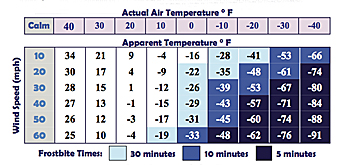
Guard against bone-chilling cold and winds
From Ada City-County Emergency Management (ACCEM)
There is a proverb that says, “Winter either bites with its teeth or lashes with its tail.” In either case it is likely the wind that enhances the harsh sensation. Colder temperatures without wind can be crisp and refreshing. It is the combination of cold and wind that seems to drive winter right down into the bone.
 The correct weather term for this feeling is Wind Chill Factor. According to the National Weather Service, the Wind Chill Index is the temperature your body feels from the combination of the air temperature and the wind speed. As wind speed increases, it can carry the heat away from your body at a more rapid rate, causing skin temperature to drop. This creates a greater chance of serious weather-related health problems in high wind conditions.
The correct weather term for this feeling is Wind Chill Factor. According to the National Weather Service, the Wind Chill Index is the temperature your body feels from the combination of the air temperature and the wind speed. As wind speed increases, it can carry the heat away from your body at a more rapid rate, causing skin temperature to drop. This creates a greater chance of serious weather-related health problems in high wind conditions.
How cold is it really?
Below is the National Weather Service Wind Chill Chart that depicts actual temperature, perceived temperature and the amount of time at each combination that it takes frostbite to occur.

Outdoor activity tips
Spending time outdoors in the winter is something most of us will do. Whether we are recreating, shoveling the driveway or just walking from a vehicle to a building we should be aware of the following conditions and remember the tips to stay safe and healthy in winter weather.
-
Extreme cold: Stay indoors as much as possible, make trips outside brief.
-
Ice: Walking on sidewalks, steps, driveways and porches becomes much more difficult in winter. Ice can form on these surfaces and sometimes not even be visible. Many cold weather injuries are the result
of falls. Use rock salt or another chemical de-icing compound to reduce this risk around your home. -
Physical exertion: Cold weather forces your body to work harder just to stay warm and places an extra strain on the heart. It is important to be aware of this and slow your pace as needed. Individuals with heart disease or high blood pressure should use extra caution when performing outdoor activities.
-
Hydration: Avoid alcoholic and caffeinated beverages, both will dehydrate you. For warm liquids stay with broths or even warmed sports/hydration beverages. However, nothing beats just plain water.
-
Dress/stay warm and dry: Dress in layers and remove layers if you feel warm. Excess perspiration will increase heat loss. Have a spare set of clothes so you can change out of wet ones.
Published 12-3-2010